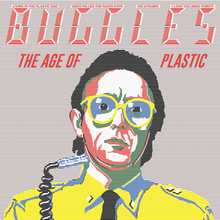
Back The Age of Plastic Spanish The Age of Plastic French The Age of Plastic Galician The Age of Plastic Italian ラジオ・スターの悲劇 (アルバム) Japanese The Age of Plastic Georgian The Age of Plastic Korean The Age of Plastic Dutch The Age of Plastic Swedish
| The Age of Plastic | ||||
|---|---|---|---|---|
 | ||||
| Studio album by | ||||
| Released | 10 January 1980 (Aus.) 8 February 1980 (UK)[1] | |||
| Recorded | 1979 | |||
| Studio |
| |||
| Genre | ||||
| Length | 36:24 | |||
| Label | Island | |||
| Producer | The Buggles | |||
| The Buggles chronology | ||||
| ||||
| Singles from The Age of Plastic | ||||
| ||||
The Age of Plastic is the debut album by the English new wave duo the Buggles, first released on 10 January 1980 on Island Records. It is a concept album about the possible repercussions of modern technology. The title was conceived from the group's intention of being a "plastic group" and the album was produced in the wake of the success of their debut record, "Video Killed the Radio Star" (1979), which topped the UK Singles Chart. Most of the album's other tracks were written during promotion of the single.
The album was recorded on a budget of £60,000. Bassist Trevor Horn was chiefly inspired by Kraftwerk's 1978 album The Man-Machine and sought unconventional recording methods for The Age of Plastic. Keyboardist Geoff Downes characterised the album as "science fiction music ... like modern psychedelic music ... very futuristic."[7] Several tracks also featured contributions from vocalist Bruce Woolley, who left the group mid-production. The backing tracks were recorded at Virgin's Town House in West London, while the vocals were recorded and mixed at Sarm East Studios. Mixing was completed before Christmas 1979.
The Age of Plastic reached number 27 on the UK Albums Chart amid a mixed critical reception. Its three subsequent singles, "The Plastic Age", "Clean, Clean" and "Elstree", charted in the UK, reaching number 16, 38 and 55 respectively. Classic Pop magazine called it the 99th best album of the 1980s,[8] Paste magazine the 45th-best new wave album of all-time.[3] A September 2010 performance at the Ladbroke Grove's Supperclub in Notting Hill, London marked the first time that the group performed the album in its entirety.
- ^ "Music Week" (PDF). p. 22.
- ^ Lester, Paul (18 August 2016). "The Outer Limits: How prog were Buggles?". TeamRock. Archived from the original on 29 December 2016. Retrieved 11 March 2019.
- ^ a b Jackson, Josh (8 September 2016). "The 50 Best New Wave Albums" Archived 1 October 2017 at the Wayback Machine. Paste. Retrieved 9 March 2018.
- ^ Cite error: The named reference
Napsterwas invoked but never defined (see the help page). - ^ "The Buggles BPI certification".
- ^ a b c "Buggles Discography". The Art of Noise Online. Archived from the original on 24 March 2010. Retrieved 29 September 2013.[better source needed]
- ^ "Buggles Sound in the New Decade". The Sydney Morning Herald. 30 December 1979. Archived from the original on 12 March 2016. Retrieved 16 July 2013.
- ^ "Top 100 Albums of the Eighties". Classic Pop. Archived from the original on 7 July 2019. Retrieved 11 February 2021.